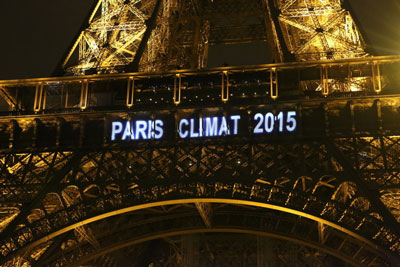COP21 Meeting in Paris
December, 2015
 Science is Confirmed as the Foundation for Global Climate Action
Science is Confirmed as the Foundation for Global Climate Action
The U.N.’s Conference of the Parties (COP21) global climate summit in Paris has just culminated in an international agreement to stop the rise in global greenhouse gas emissions. This marks not the end of a meeting, but the beginning of a process that will require an unprecedented scientific and policy effort around the world for years to come.
We sometimes fail to recognize how central science was in achieving this agreement. The success of the Paris summit comes in large part from the acceptance and understanding of decades of scientific research. It is a significant milestone that 195 nations unanimously recognized “the need for an effective and progressive response to the urgent threat of climate change on the basis of the best available scientific knowledge.” Science will also form the basis for ongoing work to be done under the COP21 agreement.
According to the AMS Statement on Climate Change, “Future warming of the climate is inevitable for many years due to the greenhouse gases already added to the atmosphere and the heat that has been taken up by the oceans.” The Statement warns that continued emissions of greenhouse gases will cause additional warming of the climate system beyond what is already inevitable due to past emissions. It goes on to note that “the ongoing warming will increase risks and stresses to human societies, economies, ecosystems, and wildlife through the 21st century and beyond, making it imperative that society respond to a changing climate.”
These are exactly the scientific points used to guide the Paris climate summit. Much work remains, diplomatically, politically, and scientifically, to implement the agreement. To ensure a robust scientific capacity for accomplishing this, national and international policy discussions should include particular attention to advancing global observations and research.
Science has been, and should continue to be, the foundation for all policy approaches to climate change. AMS members and their international colleagues are positioned to deliver the expertise and information in all areas, while helping the world take the next steps foreseen by the COP21 agreement.